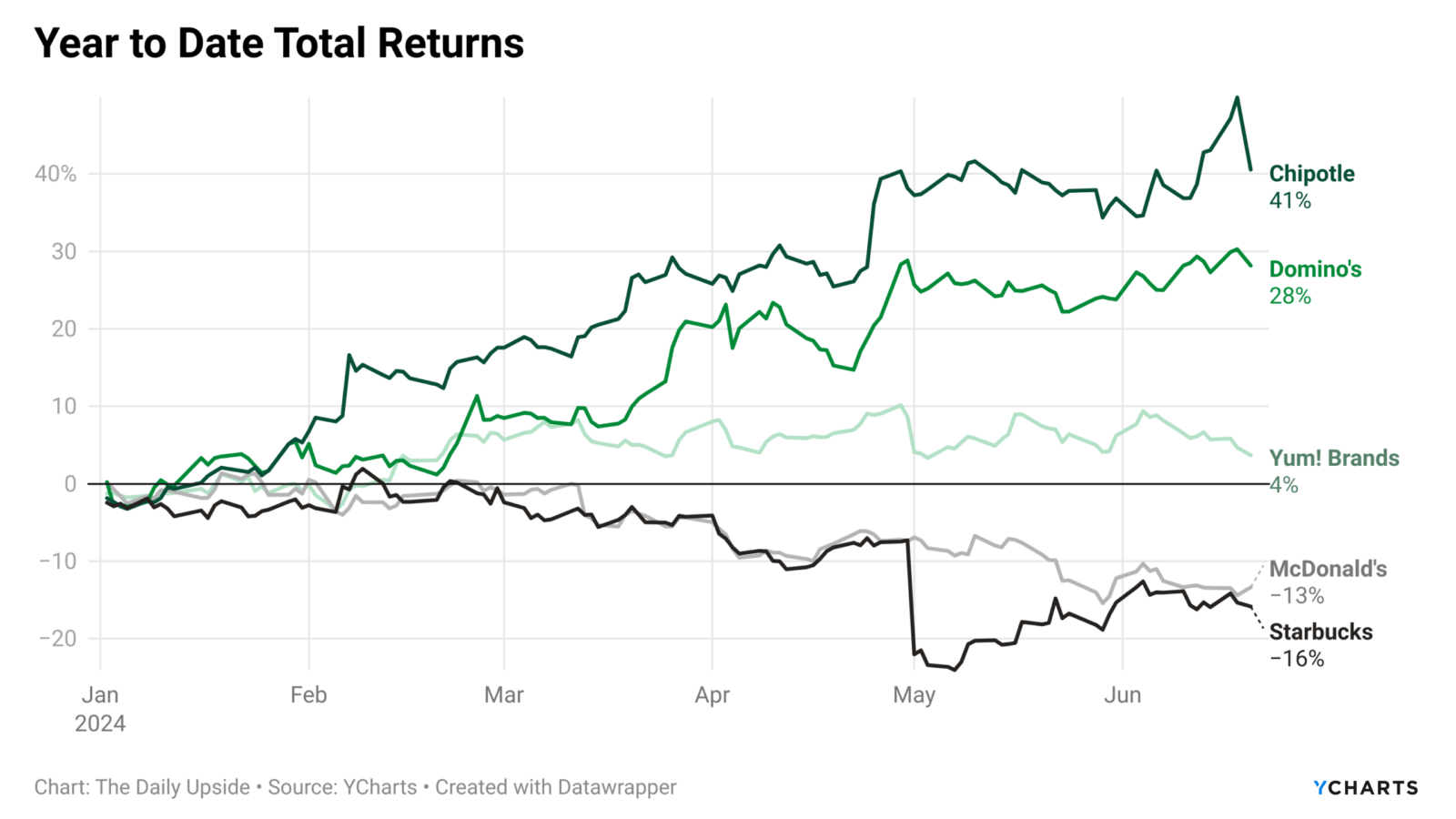Good morning and happy Monday.
In case you missed it, tomorrow we are launching FA Upside, a newsletter designed exclusively for the wealth management community. In a space plagued by dry, commoditized news, we plan to bring actionable insights directly to your inbox. If you’re a professional in this space, subscribe for free industry news, insights to grow your AUM, and investing strategies that will move the needle. Sign up now to receive the inaugural edition tomorrow.
The Costs of Healthcare Hacks Are Mounting

The world is full of crooks, but it takes a truly dastardly person to extort a hospital.
The frequency of cyberattacks on healthcare systems and hospitals is increasing, headlined this year by enormous breaches at UnitedHealth and Ascension. It’s unclear just how lucrative an enterprise it is to hold a health system’s technology hostage, but what is calculable is the huge costs that healthcare providers have to bear in the wake of an attack — not to mention the terrible impact on patient care.
Hacks and Quacks
The disruption of ransomware attacks can cause visceral damage to patient care. This month, the UK’s National Health Service had to put out an emergency call for Type O blood donors in London after a ransomware attack on a blood analysis contractor knocked out the health service’s ability to decipher what type of blood it had banked up. Meanwhile, one nurse told NPR he nearly gave a baby a “wrong dose of narcotic” due to the chaos caused by the Ascension hack.
But the costs continue once a healthcare provider has actually resolved an attack. In April, UnitedHealth said the cyberattack it faced in February cost the company $872 million just in the first quarter of this year, and projected costs could rise as high as $1.6 billion. Both United and Ascension have been hit with class-action lawsuits, and not just from impacted patients. UnitedHealth investors have filed a class-action suit accusing the company of failing to erect proper firewalls. The Health Insurance Portability and Accountability Act (HIPAA) requires healthcare providers to implement “reasonable and appropriate” cyber protections, which only gets more and more difficult in a world where hackers are targeting more and more hospitals:
- “There are instances where some healthcare providers, especially smaller ones, may struggle to afford the level of cybersecurity they realistically need,” Layna Cook Rush, head of the Data Incident Response Team at legal firm Baker Donelson, told The Daily Upside. She added that cyberattacks on healthcare systems are growing in both frequency and sophistication.
- Shankar Somasundaram, CEO of cybersecurity firm Asimily, said that many hospitals operate on “thin margins.” He added that hospitals are increasingly using internet-dependent equipment, which only increases a hospital’s attack surface.
Have You Tried Turning It Off and On Again: Unfortunately, sometimes good cybersecurity is simply a matter of implementation. Oren Koren, co-founder of cybersecurity firm Veriti, said he has worked on cases where a hospital was hacked simply because its security systems weren’t properly set up by the staff, and even came across staff shutting off security features because they interfered with the continuity of patient care. “In any hospital that we’ve worked in, something was not enabled,” Koren told The Daily Upside, adding, “I have encountered healthcare associates who have disabled everything because they care about the patient.” Worse, according to Koren: Cybercriminals and the black market in which they operate are simply evolving quicker than hospitals and their staff can adjust.
Actionable Intelligence, Built for the Modern Financial Advisor
The wealth management industry is a notoriously competitive industry. On top of that, advisors must balance client needs, craft top-tier investment strategies, navigate volatile markets, and manage operations. All this can be overwhelming.
Enter FA Upside — a brand new newsletter backed by us, The Daily Upside, for modern financial advisors. This product, led by seasoned journalist Sean Allocca, formerly of Financial Planning and InvestmentNews, is a mecca for those who want to build a successful advisory practice. Get investment commentary from the brightest minds in finance and practical tips for running your business effectively.
Forget Burgers, Chicken, and Coffee. Chipotle is in a League of Its Own.
We know guac costs extra, and we don’t care.
Since going public in 2006, the California-based Chipotle Mexican Grill has seen its share price skyrocket 7,500%, and by market close Friday, it was the only food chain among the top 20 best-performing stocks on the S&P 500 this year.
One Double Meat Burrito, Please
Chipotle fans don’t mind paying a little extra. That doesn’t seem to be the case at other food outlets, including the one Ray Kroc built. In the first quarter, McDonald’s and its 42,000 global locations generated more than $6 billion in parent company revenue. However, same-store sales fell short of Wall Street’s expectations. Menu prices in the US — which have increased 100% in the past decade, according to FinanceBuzz — have begun to scare away low-income Americans.
Now the burger giant is looking to win those customers back with a new $5 value meal and “Free Fries Fridays.” Burger King, Wendy’s, and Starbucks have also jumped on the budget-friendly bandwagon with their own deals. McDonald’s and Starbucks are actually some of the worst S&P performers this year, seeing their share prices drop roughly 13% and 16%, respectively.

And yet, business is better than ever at Chipotle, even though order prices start closer to $10 (and that’s without chips and queso blanco) and portion sizes have allegedly gotten smaller, according to outraged customers:
- Chipotle’s stock is up roughly 45% this year and is trading at $3,200 per share. However, that figure will get clipped this week as the company rolls out its 50-for-1 stock split, one of the largest in New York Stock Exchange history.
- According to Numerator, Chipotle customers are 34% more likely to be high-income earners making more than $125,000 a year — and that’s key to its business model. In its SEC filings, the company says one of its main goals is to persuade customers to pay higher prices for its “responsibly raised” meat and hormone-free dairy products.
And a Side of Cheesy Bread: The build-your-own burrito player does have one peer. Domino’s — whose share price has risen 26% YTD — isn’t too far behind Chipotle on the S&P’s top performers. Its success is thanks in part to increased marketing on Uber Eats, a revamped loyalty program, and offering consistent deals and discounts before such things were trendy. Haters don’t consider it real pizza, but that’s real money people are spending for their pie.
After Oil, the UAE Wants to be a Renewables Giant
At least one OPEC nation sees a future for itself weaning us off oil.
After announcing a deal to acquire the biggest renewables company in Greece last week, Masdar, the United Arab Emirates state-backed renewables company, is on the hunt for more deals, the Financial Times reported this weekend. The timing couldn’t be better.
Headwind Power
Depending on who you ask, peak oil consumption has either already happened or is soon on the horizon. But that hasn’t exactly spelled opportunity for the renewable alternatives. Despite global renewable energy capacity increasing by 50% last year, the industry faces tremendous headwinds — particularly as high interest rates kneecap even further growth.
That’s contributed to a valuation haircut across the fast-growing sector’s biggest firms. In turn, that’s led Masdar — which happens to be led by the same Emirati official, Sultan Ahmed Al Jaber, who also heads the petrostate’s oil firm — to embark on an acquisitions shopping spree. Call it a case of throwing good (for the environment) money after bad:
- Masdar on Thursday announced it would acquire a 67% stake in Greek renewables giant Terna at a €3.2 billion valuation, with plans to launch an all-cash offer for remaining shares upon completion of the deal.
- In March, Masdar finalized its €1.6 billion acquisition of a 49% stake in Spanish energy giant Iberdrola’s Baltic Sea wind farm, and announced a deal to acquire Energy Capital Partners’ 50% stake in San Diego-based Terra-Gen Power.
Easy Being Green: Masdar, backed in part by the UAE’s $300 billion Mubadala sovereign wealth fund, isn’t the only player busting into the renewables space while claiming to have the deep pockets needed to fuel the sector’s next stage of growth. KKR is in the midst of a €2.8 billion takeover of German-based Encavis, while Singapore’s Temasek state investment fund, along with Canadian investment firm Brookfield, said last month they’ve entered talks on a €6.1 billion takeover of French wind and solar firm Neoen. Being green is easier when there’s green attached.
These Two Brothers Are Uncovering Wall Street’s Biggest Finds. Deiya Pernas (former executive at a $3.5 billion fund) and Dean Pernas (trained chemical engineer) left their jobs to start an equities research firm. Pernas Research’s portfolio has achieved a 23.92% gross annualized return since inception. Want to receive their monthly stock ideas and weekly research highlights in your email inbox (at no-cost)? Sign up right here.
Extra Upside
- IP-No: Seven months after filing for a US IPO, Shein’s listing plans appear completely stalled out.
- Dealer’s choice: Hacker group behind massive auto dealer attack demands millions of dollars in ransom.
- Tired of Negative News? Check out our friends at Nice News, an email digest sent to over 750,000 readers that features only positive news stories. Join for free here.*
* Partner
